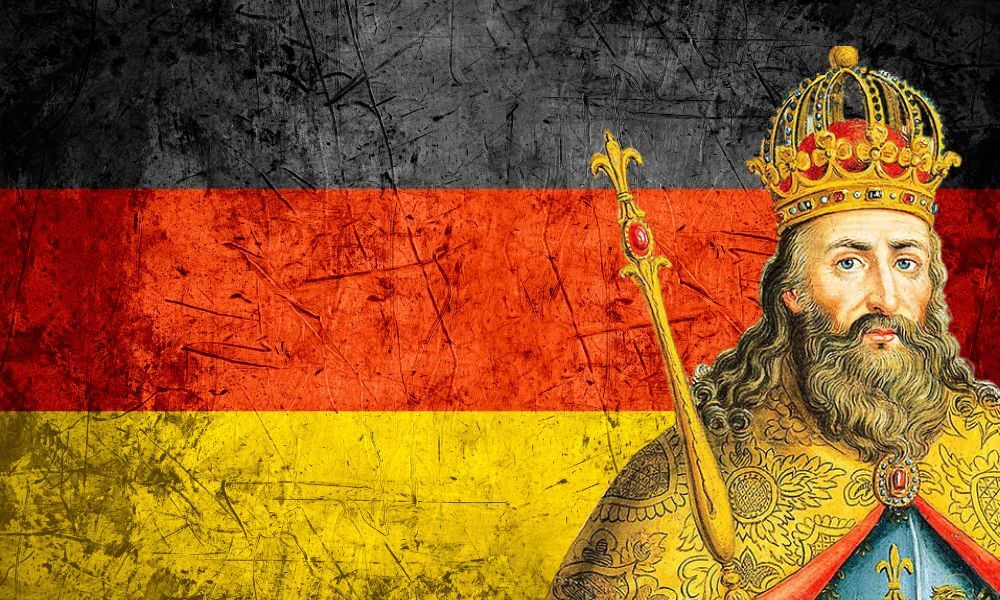Charlemagne would have primarily spoken Frankish, a West Germanic language spoken from around the 5th to the 9th Century in Central Europe. This would have been his native language and the language he used on a day-to-day basis. There is also ample evidence that he was comfortable with Latin, but he wouldn’t have spoken it much.
Charlemagne is a figure in European history with few rivals.
He united western and central Europe and founded what would later become the Holy Roman Empire.
His influence in Europe is very hard to overstate and he is one of the single most influential figures not only of the period in which he lived but throughout history.
Let’s find out more.

What was Charlemagne’s native language?
Charlemagne’s native language would have been Frankish, the language spoken by the Franks before him.
Though we have a clear sense of the singular “Frankish” language, at the same time there were many dialects and variants of it that could be heard around this part of the world at this time in history.
The dynasty that preceded Charlemagne were the Merovingian Frankish kings.
They would have spoken Old Frankish.
Charlemagne, though, belonged to a more easterly dynasty, and there were specific phonetic developments happening up to his birth and over the course of his own lifetime.
In any case, though, the language he spoke would have been Frankish, and yet at the same time that language was changing as he was speaking it.
Charlemagne, then, probably spoke a Rhenish Franconian dialect.
Franconian, as opposed to Frankish, is a collective term for West Germanic languages categorizing many historical languages spoken in central Europe.
Rhenish refers to the Rhine, a major European river and geographical linguistic category.
There were several dialects of Franconian spoken along the Rhine, and we can perhaps say that the language Charlemagne spoke was on the fringes of what would become modern German.
We will look more closely at the best modern equivalent of Charlemagne’s language shortly, but in truth there were countless different languages spoken across his “empire” and indeed in the place he lived, and most of these language groups also had more than a few dialects within them.
So, there’s a short answer and a long answer.
The short answer is that Charlemagne spoke Frankish, or Old Franconian; the long answer is that he spoke an evolving and changing dialect of Frankish.
Did he know any other languages?
Did Charlemagne know other languages?
Charlemagne is indeed said to have known some other languages, though his native Frankish was always the language he was most comfortable in.
It is most well-known that he was comfortable in Latin, and could speak and understand it well.
He would very often receive correspondence in Latin, and there’s no evidence he needed it translated.
Plainly, then, he was very comfortable with Latin and given his campaigns throughout Europe, this is unsurprising.
Latin was already the language of the church and usually of royal chancellors and scribes.
Thus, knowing Latin was a big advantage for him and it gave him many opportunities to converse directly with other leaders.
He is also said to have had some understanding of Greek, according to one contemporary chronicler, known as Einhard. Einhard himself, though, states that Charlemagne could understand Greek much better than he could speak it.
This is not to diminish the impressiveness of comprehending at least three languages, but it perhaps would not be quite right to say he could speak Greek.
There is also a common myth that Charlemagne knew and could speak Arabic.
This derives from an account written centuries after his death which is largely fictional.
Is Frankish the same as French?
Frankish is not the same as French, they are part of entirely different language families.
As mentioned, Frankish or Old Franconian was a West Germanic language, and had developed out of Proto-Germanic languages.
Though much of Charlemagne’s “empire” encompassed modern France, and he is in many ways important to French tradition, he was not French in any real respect.
French is a Romance language, having evolved out of Vulgar Latin in Francia.
Frankish was spoken along the Rhine and mostly evolved into German and other languages like Dutch, although again it’s hard to pin down the exact modern analogue of Old Franconian.
Nevertheless, let’s give it a try.
What is the closest language to Frankish?
There are today multiple dialects of modern German, used both in Germany itself and in other places like Switzerland.
The truth is that, depending on whom you ask, you may get different answers to this question.
Most would agree that Frankish is closest to modern High German, and that Frankish was directly analogous to Old High German.
Others, though, would suggest that Dutch is much closer to the language of the Franks.
This is certainly highly debatable, but the truth is that Frankish had enormous influence on all of these languages, while being most closely comparable to modern High German.
So, it’s not quite as clear cut as you might at first think.
Charlemagne was no doubt a Frank, but at the same time there was a huge shift in language going on in the time before and after his death.
We can with some confidence call the language he spoke Frankish, and yet at the same time it would have exhibited significant differences from other Frankish dialects.
The language he spoke is most closely analogous with modern German.

